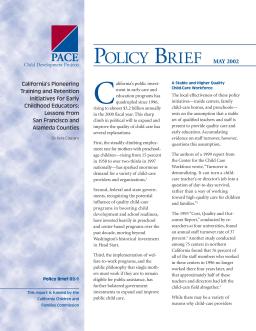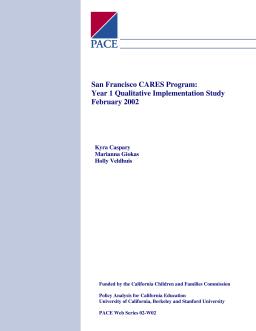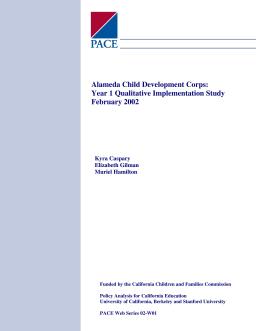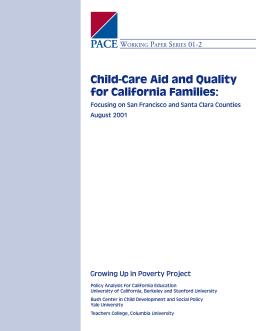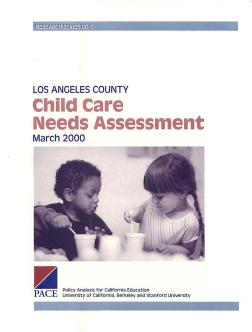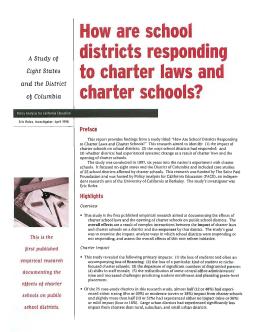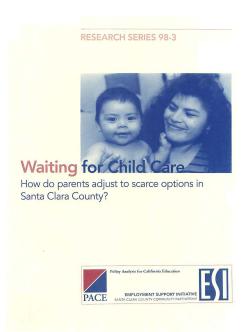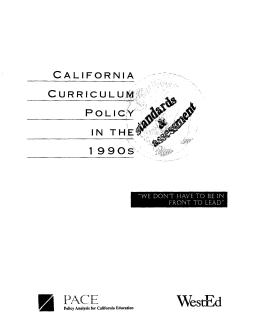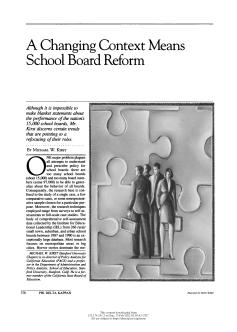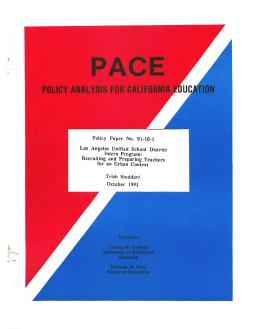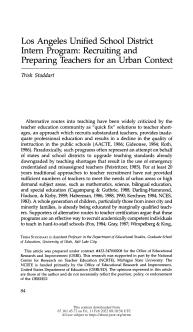Lessons from San Francisco and Alameda Counties
Published
Summary
The policy brief discusses the reasons behind California's increase in public investment in early care and education programs, including the rising demand for childcare, recognition of the potential benefits for child development and school readiness, and the implementation of welfare-to-work programs with results and insights from both San Francisco and Alameda Counties.
Year 1—Qualitative Implementation Study
Published
Summary
This report on San Francisco County’s CARES program (SF CARES) provides guidance for policymakers, program administrators, and childcare advocates planning similar initiatives. PACE collected feedback from program planners, stipend recipients, and other childcare community members on aspects of the planning and implementation process. SF CARES successfully distributed over 400 stipends in the program’s first year, but challenges remain in reaching a broader array of childcare providers and communicating program goals.
Year 1—Qualitative Implementation Study
Published
Summary
This report provides guidance on implementing childcare retention initiatives based on Alameda County’s Child Development Corps program. PACE conducted focus groups with stakeholders to gather feedback on the planning and implementation process. The program saw increased commitment from providers to their profession and seeking training opportunities, but challenges remain with fitting permit requirements to family providers and relevance of courses.
Focusing on San Francisco and Santa Clara Counties
Published
Summary
This report analyzes California's early childhood education programs and finds that attending public preschool programs improves school readiness and academic performance, particularly for low-income children. The study also shows that the economic benefits of preschool programs far outweigh the costs, including increased earnings and decreased need for remedial education and social services. Recommendations include expanding access to high-quality preschool programs for low-income children in California to reduce economic inequality.
Published
Summary
A study conducted for the Los Angeles County Department of Public Social Services aimed to determine the supply and demand of licensed childcare in the county, with a focus on low-income communities and special types of care. The survey analyzed data at three levels: county-wide, service planning areas, and supervisorial districts. Results showed disparities in childcare supply across the county, with shortages in special types of care and little information on where childcare is needed.
A Study of Eight States and the District of Columbia
Published
Summary
This report presents the results of a study investigating the impact of charter schools on school districts, how they responded, and whether they experienced systemic change due to charter laws. The study focused on eight US states and the District of Columbia and included case studies of 25 affected school districts. The research was funded by The Saint Paul Foundation and conducted in 1997, six years into the charter school experiment. PACE hosted the study.
How Do Parents Adjust to Scarce Options in Santa Clara County?
Published
Summary
In 1998, the PACE research center surveyed low-income and blue-collar parents to help streamline the process of finding childcare, in response to the state's welfare reform legislation. The survey included 300 in-depth interviews and covered topics such as employment, searching for childcare, interim childcare, and perceptions of care quality. The report addresses the policy problem and how parents perceive their limited childcare options.
Standards and Assessments
Published
Summary
This study traces California's curriculum-related reforms in mathematics and science during the 1990s, examining the role of the California Department of Education and the state's shifting political and policy context. It analyzes the perceptions of state officials, experts, and the public and how they influenced state policy changes. The authors raise questions about problems associated with curriculum policy in California and presents policy recommendations mentioned during interviews and document analysis. The study does not assess the impact of curriculum on school practice.
Published
Summary
The research base for understanding and prescribing policy for school boards is limited due to the large number of boards and members. Common school boards, especially those of small districts, are less researched. To address this, overall trends affecting most boards should be analyzed to determine the need for and direction of school board reform. Waiting for representative data on all boards will delay improvements to policy making. Major changes in school board roles, functions, and operations are necessary due to the interaction of these trends.
Recruiting and Preparing Teachers for an Urban Context
Published
Summary
Traditional teacher recruitment fails to meet urban area and high-demand subject needs. Alternative certification programs offer a solution but are criticized for being a "quick fix". The LAUSD Intern Program case study addresses questions on effectiveness and preparation of alternative-certified teachers. On-the-job training is context-specific and not a replacement for college-based education.
Recruiting and Preparing Teachers for an Urban Context
Published
Summary
This article discusses the criticism of alternative routes to teaching, which are seen as inadequate and leading to declining instructional quality, but are attempting to address the shortage of qualified teachers in urban and high demand subject areas. Supporters argue that they are effective in recruiting competent teachers for hard-to-staff schools and replacing the emergency credential system with rigorous training. The article highlights the impact of teacher shortages on inner city and minority students who are currently being educated by marginally qualified teachers.
